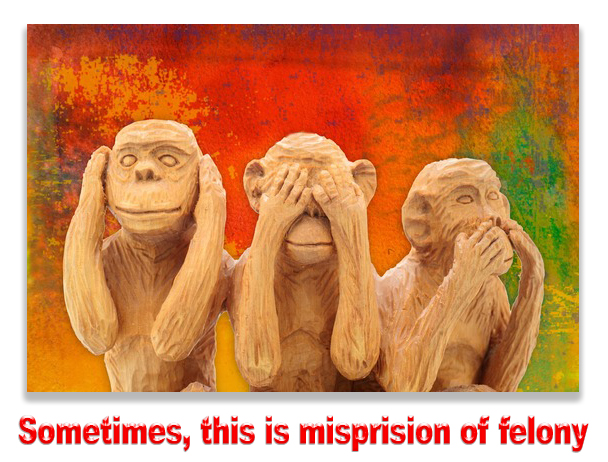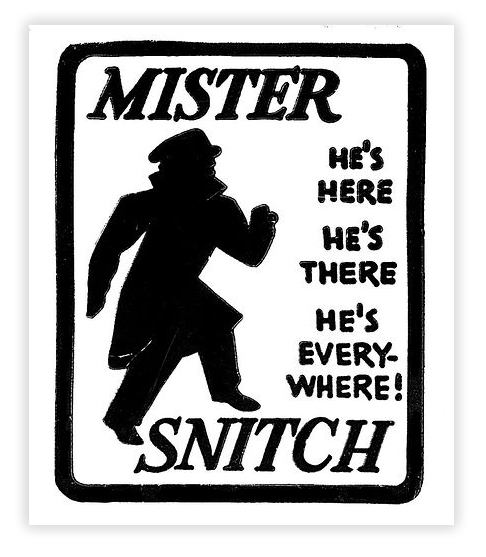We post news and comment on federal criminal justice issues, focused primarily on trial and post-conviction matters, legislative initiatives, and sentencing issues.
“NARC, NARC!”
 Karen Olsen, a former USDA official who helped manage one of the agency’s “gravy train” grant programs, retired so that she, too, could feed at the money trough she once oversaw. She and Bob Wells got a grant to open a milk processing facility, back when milk was worth something, which it isn’t these days.
Karen Olsen, a former USDA official who helped manage one of the agency’s “gravy train” grant programs, retired so that she, too, could feed at the money trough she once oversaw. She and Bob Wells got a grant to open a milk processing facility, back when milk was worth something, which it isn’t these days.
To economize, Karen and Bob co-located their new processing plant with an ice cream factory built by Kyle Beus, who had also scored the money he needed for the place from USDA. But Kyle cut corners, renting junk equipment where his USDA grant called for buying new stuff.
Karen found out Kyle had overbilled USDA and pocketed the difference. She told her assistant she could send Kyle’s “ass to jail,” and told her board of directors that Kyle “has put the entire dairy industry at risk for an ever-widening investigation closing off all loan sources and public goodwill.” Nevertheless, Karen continued to use Kyle’s equipment valuations in her own records, and did not turn Kyle in to the USDA.
 The misprision of felony statute makes it a crime for anyone having knowledge of the actual commission of a felony to conceal and not make it known to some judge or person in authority.” To convict someone under the statute, 18 USC § 4, the government has to prove (1) that someone else committed a felony; (2) that the defendant had full knowledge of that fact; (3) that he or she failed to notify the authorities; and (4) that he or she took affirmative steps to conceal the crime.
The misprision of felony statute makes it a crime for anyone having knowledge of the actual commission of a felony to conceal and not make it known to some judge or person in authority.” To convict someone under the statute, 18 USC § 4, the government has to prove (1) that someone else committed a felony; (2) that the defendant had full knowledge of that fact; (3) that he or she failed to notify the authorities; and (4) that he or she took affirmative steps to conceal the crime.
The parties agreed that under the first element, Karen had to know that Kyle had committed a crime. The government argued, however, that she did not necessarily have to know that the crime was a felony. Any crime was good enough.
Last week, the 9th Circuit disagreed. While the misprision statute did not make it clear, courts were to presume that the “knowledge” requirement – known as scienter – applied to both phrases. The history of misprision strongly suggests that “Congress intended the misprision statute to apply solely to conduct the average person would understand as criminal and serious.”
The Circuit concluded that “in sum, in light of Supreme Court precedent and relevant history, we hold the misprision statute requires knowledge not only that the principal engaged in conduct that satisfies the essential elements of the underlying felony, but also that the underlying offense is a felony.
 Karen was not off the hook, however. The 9th noted that Congress had clearly defined “felony” as a crime punishable by death or imprisonment for more than one year, and the USDA forms for the grant, with which Karen was well acquainted, had printed on them the warning that anyone making “false statements to the USDA could be imprisoned up to five years.” That was enough for the jury to hold that Karen knew Kyle’s lies were felonies.
Karen was not off the hook, however. The 9th noted that Congress had clearly defined “felony” as a crime punishable by death or imprisonment for more than one year, and the USDA forms for the grant, with which Karen was well acquainted, had printed on them the warning that anyone making “false statements to the USDA could be imprisoned up to five years.” That was enough for the jury to hold that Karen knew Kyle’s lies were felonies.
There is something a little disturbing in making it a felony not to “narc” out other peoples’ crimes. The Circuit itself observed in passing that “misprision has become a little used and much maligned criminal charge.” England, where the crime originated, eliminated the offense in the mid-1960s, and “American commentators have urged Congress to do the same, arguing the crime has outlived its usefulness in light of modern methods of law enforcement.”
United States v. Olsen, Case No. 15-30022 (9th Cir., May 15, 2017)
– Thomas L. Root

